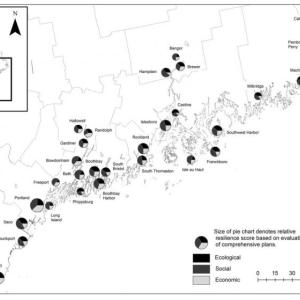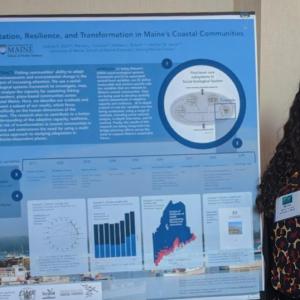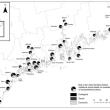UMaine study concludes coastal communities differ in their resilience to environmental change
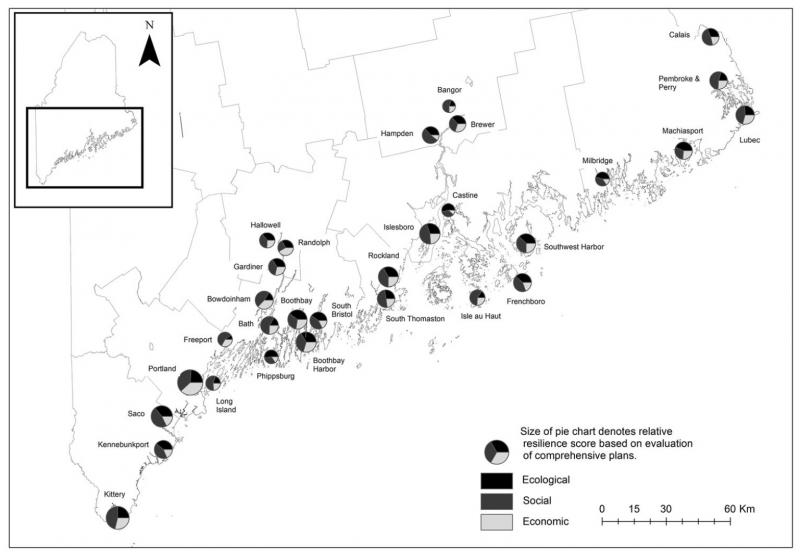 Comprehensive plan analysis scores by municipality, mapped across the social, ecological, and economic domains of resilience. This figure was adapted from Cucuzza et al. 2019, published in the Journal of Environmental Planning and Management.
Comprehensive plan analysis scores by municipality, mapped across the social, ecological, and economic domains of resilience. This figure was adapted from Cucuzza et al. 2019, published in the Journal of Environmental Planning and Management.
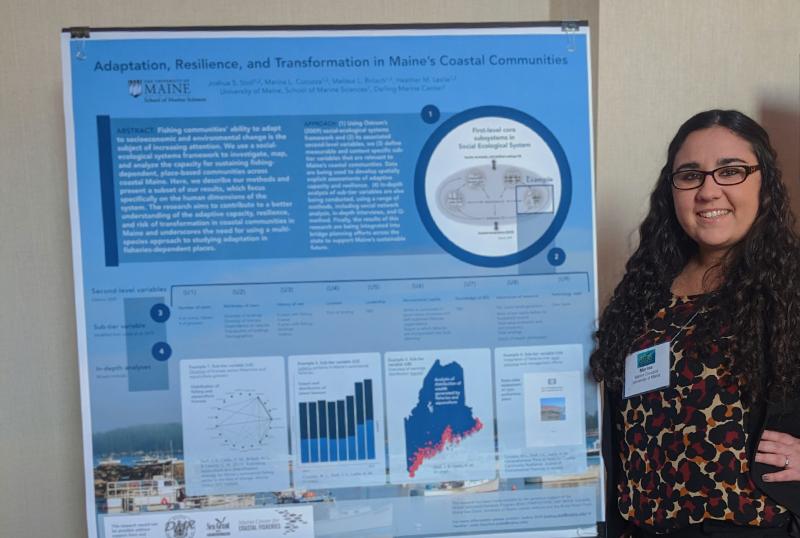 Marina Cucuzza presents at the Gulf of Maine 2050 International Symposium Nov. 4-8, 2019. Photo by Melissa Britsch.
Marina Cucuzza presents at the Gulf of Maine 2050 International Symposium Nov. 4-8, 2019. Photo by Melissa Britsch.
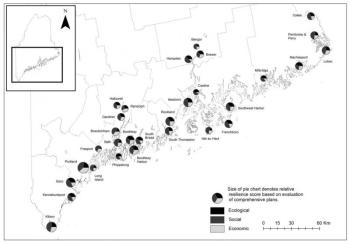 Comprehensive plan analysis scores by municipality, mapped across the social, ecological, and economic domains of resilience. This figure was adapted from Cucuzza et al. 2019, published in the Journal of Environmental Planning and Management.
Comprehensive plan analysis scores by municipality, mapped across the social, ecological, and economic domains of resilience. This figure was adapted from Cucuzza et al. 2019, published in the Journal of Environmental Planning and Management.
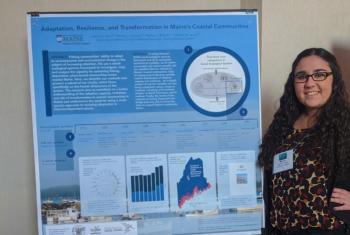 Marina Cucuzza presents at the Gulf of Maine 2050 International Symposium Nov. 4-8, 2019. Photo by Melissa Britsch.
Marina Cucuzza presents at the Gulf of Maine 2050 International Symposium Nov. 4-8, 2019. Photo by Melissa Britsch.
Maine’s coastal communities face multiple environmental and socioeconomic changes, including declining fisheries, loss of working waterfronts, and warming oceans. With more than 3,500 miles of coast, Maine people have important questions about how their communities are preparing for and adapting to these changes.
Marina Cucuzza, a graduate student in the University of Maine School of Marine Sciences, who is a candidate in the dual degree program in marine biology and marine policy at UMaine is exploring the role that municipal comprehensive plans play in preparing communities for environmental change. In a recent paper published in the Journal of Environmental Planning and Management, Cucuzza evaluated comprehensive plans drafted by Maine coastal communities.
Conclusions from the research indicate that: “climate change is, and will continue to, impact every aspect of municipalities including infrastructure, but also public health, housing and biodiversity. Building resilience requires significant structural shifts to address the root causes of challenges in the community, as well as a paradigm shift in planning to move towards a more proactive approach and a holistic consideration of resilience.”
“Planning for change is critical to ensuring resilient coastal communities, now and in the future,” said Cucuzza, in an news release. She is affiliated with the Darling Marine Center in Walpole.
Cucuzza and her UMaine faculty advisers, Heather Leslie and Joshua Stoll, scored each plan based on the degree to which it incorporated key social, ecological and economic resilience principles. Indicators of resilience include planning for the impacts of sea level rise, environmental conservation, and measures that promote physical and mental health as well as community and economic development.
The study indicated variability among the plans, with some communities directly incorporating principles of resilience and others engaging with them in more limited ways. The researchers found that social aspects of resilience, such as a desire to maintain the rural nature of the community, were prioritized over ecological and economic aspects. Policies that anticipate sea level rise and other climate change-related impacts were absent from many plans. The researchers also found that more recent plans had higher resilience scores, suggesting that communities are beginning to incorporate more aspects of resilience as they plan for the future.
Cucuzza’s research was catalyzed by her involvement in developing the town of Georgetown’s comprehensive plan. She served as technical staff to the group that drafted the Marine Resources chapter of the plan over the last two years. Working alongside fishermen and other community members, she gained a first-hand perspective of the challenges that coastal communities face and the role that local planning plays in preparing communities for changes in the future.
Cucuzza’s research is part of a larger project on coastal community resilience, co-led by Leslie and Stoll in collaboration with Maine Sea Grant, Maine Center for Coastal Fisheries, and the Maine Department of Marine Resources. Her work was supported by the NOAA Saltonstall-Kennedy Grant Program under Grant NA17NMF4270198, together with the UMaine College of Natural Science, Forestry, and Agriculture, the Maine Economic Improvement Fund, Maine Sea Grant, and the Lobster Institute of the University of Maine.
The abstract and full article can be found online at: https://doi.org/10.1080/09640568.2019.1700943
Founded in 1965, the Darling Marine Center’s mission is to connect people to the ocean. The center’s researchers, staff and students work alongside fishermen, aquaculture entrepreneurs, marine industry professionals and other members of the community in Maine and around the world. More information is available at dmc.umaine.edu
Event Date
Address
United States

